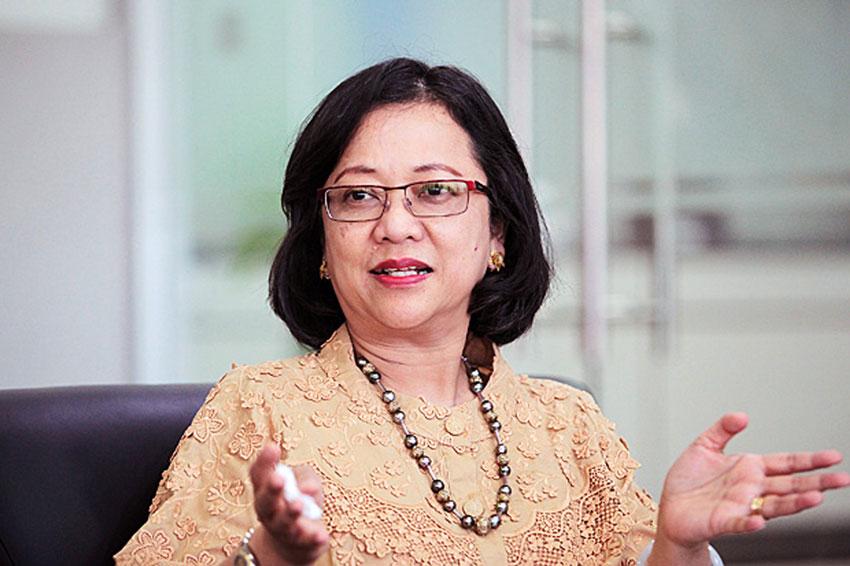04 Apr 2020 - {{hitsCtrl.values.hits}}


 As Sri Lanka continues to battle coronavirus (COVID-19), the United Nations (UN) says emergency fiscal support will help the country cope with the added burden on the healthcare system due to extra patients and testing. UN Under-Secretary-General and Executive Secretary of the United Nations Economic and Social Commission for Asia and the Pacific (ESCAP), Ms. Armida Salsiah Alisjahbana told Dailymirror measures which need to be taken by the government to respond to COVID-19 would place more stress on debt in the country, similarly to many other countries in the region. She urged the international community to offer an immediate fiscal assistance package to countries like Sri Lanka to help them manage outstanding foreign debt. Excerpts:
As Sri Lanka continues to battle coronavirus (COVID-19), the United Nations (UN) says emergency fiscal support will help the country cope with the added burden on the healthcare system due to extra patients and testing. UN Under-Secretary-General and Executive Secretary of the United Nations Economic and Social Commission for Asia and the Pacific (ESCAP), Ms. Armida Salsiah Alisjahbana told Dailymirror measures which need to be taken by the government to respond to COVID-19 would place more stress on debt in the country, similarly to many other countries in the region. She urged the international community to offer an immediate fiscal assistance package to countries like Sri Lanka to help them manage outstanding foreign debt. Excerpts:
Q Do you think the Asia Pacific region was under-prepared to face COVID-19?
The COVID-19 pandemic is exacting an unprecedented toll on Asia and the Pacific. No country has been spared from the devastating impacts on well-being and shocks to the economy and healthcare systems.
We know that with stronger investments in people and planet, some of these impacts could have been mitigated. That is why we are arguing over responses that prioritise people while cushioning economic shocks to build resilience against future pandemics. Investment must be directed towards providing universal health coverage and a social protection floor for marginalised populations. Social protection serves as a stabiliser in times of uncertainty to protect the most vulnerable. Immediate fiscal measures are also essential and must support job retention and guarantee minimum living standards for workers and households.
Q Coronavirus has had a severe impact on Sri Lanka, like it has on several other countries. What can a country like Sri Lanka do to mitigate the serious impact this is having on its economy?
Given the stage of the COVID-19 outbreak in Sri Lanka, the priority now is still containing further spread of the disease to save lives and minimise potential economic damage. For this, well-targeted emergency fiscal support is required to cope with the added burden on the healthcare system due to extra patients and testing. Most affected countries in the region are already providing fiscal subsidies for medical testing and treatment of the virus as well as fiscal support for emergency public interventions to increase hospital capacity and medical supplies. Furthermore, fiscal measures are required to support jobs and living standards. There needs to be fiscal support for employers to retain jobs. These can be through targeted tax exemptions and fiscal subsidies to SMEs – the most affected business sector – and the informal sector. There also needs to be direct support for employees and households to guarantee minimum living standards. These can be through emergency measures to extend medical and employment insurance to those not sufficiently covered or by providing direct cash transfers for consumption smoothening.
The COVID-19 pandemic is exacting an unprecedented toll on Asia and the Pacific. No country has been spared from the devastating impacts on well-being and shocks to the economy and healthcare systems. We know that with stronger investments in people and planet, some of these impacts could have been mitigated
Q Sri Lanka has large outstanding foreign debt and the impact the virus is having on the economy seems to be only putting the country at risk of plunging into deeper debt. Is a debt moratorium something ESCAP encourages countries in this region at the time?
The measures need to be taken by the government to respond to COVID-19 will certainly place more stress on debt in the country, similarly to many other countries in the region. This can be seen from recent experience with debt rises following other large economic shocks in the region, such as the global financial crisis of 2008/2009 and the commodity price shock of 2014/2015. Stronger international cooperation and support would be required to support the countries who have most difficulty. One aspect of this should be an immediate fiscal assistance package by the international community for the most vulnerable economies. Fiscal help should also certainly be given by international and bilateral creditors through policies for debt deferral, and indeed debt alleviation such as through waiving of interest payments as called for recently by our Secretary-General.
Q How would you propose the Asia Pacific region to collaborate in ensuring the impact of coronavirus does not seriously hurt countries in the region?
Regional cooperation can provide additional avenues to respond to the pandemic. Establishing a sub-regional or regional public health emergency fund can help mobilise financial resources and provide targeted support for countries. ESCAP recently estimated that the region needs to invest an additional $880 million annually by 2030 in emergency preparedness, risk management and response to further strengthen health systems. Such affordable investment can improve effectiveness in dealing with such crises to contain economic losses and, more importantly, save human lives. The United Nations, including ESCAP, could be a suitable platform to manage such an emergency fund, to bring stakeholders together, including member states, regional intergovernmental organisations, multilateral development banks, the private sector, philanthropies and civil society.
In addition, regional cooperation can play a crucial role in strengthening research, contributing to sharing of knowledge and best practices, helping coordinate interventions and supporting development of critical treatment strategies, including vaccines and other drugs. Dealing as equal partners, such cooperation will ensure the fruits of research and development will benefit the entire population of the region, and beyond, at an affordable price.
Q SAARC had recently discussed working together to tackle the virus and also established an emergency fund. Do you see a need for SAARC to maybe link-up with other sub-regional associations and broaden cooperation?
SAARC leaders have revived their cooperation for addressing this shared challenge by establishing an emergency response fund proposed by PM Modi of India. This is definitely a good practice for other sub-regional organisations to follow up. Given that the spread of COVID-19 and its socio-economic impacts have a larger cross-border sub-regional dimension, I hope the SAARC initiative will be scaled up and replicated by other sub-regions and sub-regional groupings such as ASEAN. We also hope this initiative would help to revive other programmes of cooperation within the SAARC framework, now that leaders have come together on a single platform and are moving ahead to take action.
Q What are the risks you see for the Asia Pacific region if more effective steps are not taken to control the spread of the virus?
Unless emergency measures are taken to contain the virus, we will continue to experience deteriorating health and economic downturns. Deceleration in GDP growth could be significant with uneven setbacks across countries, depending on their current economic conditions and the exposure to COVID-19. Large and well-targeted emergency fiscal support is required to contain the spread of the disease and cope with the burden of extra patients and testing. Governments should be prepared to show flexibility in their budgets to effectively use available fiscal resources to respond to the pandemic.
In addition, without stepping up protection measures for the poor, the pandemic threatens to widen inequality gaps. Governments in the region are at a pivotal point to strengthen health and social protection systems. Over 60 per cent of the Asia-Pacific population lack access to social protection. Many live and work in unsafe conditions. We have also seen how older persons are at higher risk, particularly in Asia and the Pacific’s ageing societies. Supporting the poor is not only right, but also smart as it builds resilience against shocks and crises over the lifecycle.
Q Sri Lanka and indeed most other countries in this region depended heavily on tourism. Tourism is now dead and the industry is looking at a really dark period ahead. How can this industry resurrect itself once all this is done and dusted with?
Indeed, tourism has been one of the most hard-hit sectors across the region with a particularly important impact on Sri Lanka. The UN predicts at the moment that global tourism arrivals will decline by at least 20-30% this year, with Asia-Pacific being the most affected. This will mean millions of jobs being lost, affecting some of the most vulnerable businesses and people, as more than 80% of tourism businesses are SMEs and with the sector employing many youth, women and rural workers. However, we do see historically that tourism is very resilient and can bounce back relatively quickly when normalcy returns and lead the economic recovery. The bounce back can be supported by financial and political support for recovery measures targeting the tourism sector, planning and implementing recovery measures and incentives in coordination with international development and donor organisations, and ensuring that tourism support is included in the wider recovery plans and actions of tourism-dependent economies.
Q There are concerns of a rise in domestic/gender-based violence in Sri Lanka as a result of the lockdown enforced in the country. How can one address this issue?
Indeed, women and girls are at greater risk of experiencing gender-based violence when movement is restricted, people are confined, and family face heightened tensions due to the crises. As the needs for prevention, risk mitigation and response services increase, we must ensure that hotlines and services for all victims of domestic violence are considered “essential services” and are kept running, and that law enforcement agencies are sensitized to the need and provide timely support, especially during the lockdown period. Some countries have included shelters for women survivors and psycho-social support in the list of essential services. This will help reduce trauma, injury and deaths during this difficult time.
At ESCAP, we will continue our work with governments, civil society organisations as well as UN Women and other UN agencies to prioritise the protection and promotion of the rights of women and girls. This crisis will test us, but we will overcome it, and perhaps even build back better and stronger, if we keep our focus on gender-equitable responses while we address the COVID-19 crisis and beyond.
06 Jan 2025 1 hours ago
06 Jan 2025 2 hours ago
06 Jan 2025 2 hours ago
06 Jan 2025 2 hours ago
06 Jan 2025 2 hours ago